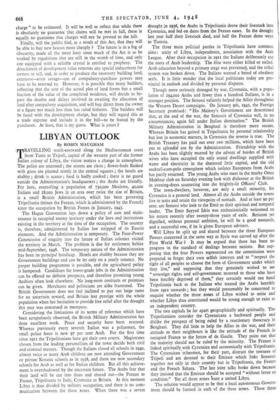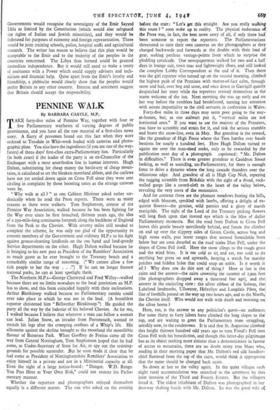LIBYAN OUTLOOK
By ROBIN NIAUGHAM IMRAVELLING south-eastward along the Mediterranean coast I from Tunis to Tripoli, capital of the western part of the former Italian colony of Libya, the visitor notices a change in atmosphere. The police are unarmed ; the streets are clean ; flower-beds flanked with grass are planted trimly in the central-squares ; the hotels are shabby ; drink is scarce ; food is badly cooked ; there is no guard outside the Administration's headquarters ; the Arabs are friendly. For here, controlling a population of 730,000 Moslems, 40,000 Italians and 28,000 Jews in an area over twice the size of Britain, is a small British Administration, which has been governing Tripolitania (minus the Fezzan, which is administered by the French) since the occupation by British Forces in January, 1943.
The Hague Convention lays down a policy of care and main- tenance in occupied enemy territory under the laws and institutions existing in the territory at the time of the occupation. The country is, therefore, admi,nistered by Italian law stripped of its Fascist elements. And the Administration is temporary. The Four-Power Commission of enquiry into the future of Italian colonies visited" the territory in March. The problem is due for settlement before mid-September, 1948. The temporary nature of the Administration has been its principal handicap. Hotels are shabby because they are Government buildings and can be let only on a yearly tenancy. No proper building programme is possible, and the agricultural policy is hampered. Candidates for lower-grade jobs in the Administration can be offered no definite prospects, and therefore promising young Arabists often look elsewhere. No long-term contracts or promises can be given. Merchants and politicians are alike frustrated. The British Government does not feel inclined to pay out large sums for an uncertain reward, and Britain lost prestige with the whole population when her hesitation to provide free relief after the drought this year was construed as meanpess.
Considering the limitations of its terms of reference which have been scrupulously observed, the British Military Administration has done excellent work. Peace and security have been restored. Whereas previously every seventh Italian was a policeman, the small police force is now 97 per cent Arab. For the first time since 1911 the Tripolitanians have got their own courts. Magistrates chosen from the leading personalities of the town decide both civil and criminal matters. Though the Italians closed all schools in 1940, almost twice as many Arab children are now attending Government or private Koranic schools as in 1938, and there are now secondary schools for Arab as well as for Indian children. But all this achieve- ment is overshadowed by the uncertain future. The Arabs fear that their land will be cut into three and shared out—the Fezzan to France, Tripolitania to Italy, Cyrenaica to Britain. At this moment Libya is thus divided by military occupation, and there is no com- munication between the three zones. When there was a severe drought in 1936, the Arabs in Tripolitania drove their livestock into Cyrenaica, and fed on dates from the Fezzan oases. In the drought last year half their livestock died, and half the Fezzan dates went to Tunisia.
The three main political parties in Tripolitania have common aims : unity of Libya, independence, association with the Arab League. After their occupation in 1911 the Italians deliberately cut the roots of Arab leadership. The elite were either killed or exiled. Arab education beyond a primary stage was prevented, and the tribal system was broken down. The Italians wanted a breed of obedient serfs. It is little wonder that the local politicians today are pro- vincial in outlook and divided by personal disputes.
Though more seriously damaged by war, Cyrenaica, with a popu- lation of 294,000 Arabs and fewer than a hundred Italians, is in a stronger position. The Senussi valiantly helped the Allies throughout the Western Desert campaigns.. On January 9th, 1942, the Foreign Secretary promised: "His Majesty's Government are determined that, at the end of the war, the Senussis of Cyrenaica will, in no circumstances, again fall under Italian domination." The British Military Administration in Benghazi is therefore more secure. Whereas Britain has gained in Tripolitania by personal relationship but lost in economic matters, in Cyrenaica the reverse is true. The British Treasury has paid out over two millions, which have been put to splendid use by the Administration. Friendship with the Arabs has been slightly marred by the advent of hordes of British wives who have occupied the only sound dwellings supplied with water and electricity in the shattered little capital, and the old cocktail-cum-polo atmosphere which isolates Europeans from Arabs has partly returned. The young Arabs who meet in the murky Omar Mukhtar club on Saturday evening look with disfavour at the British in evening-dress sauntering into the brightly-lit Officers' Club.
The town-dwellers, however, are only a small minority, for Cyrenaica is a pastoral land. Almost all the Arabs outside the towns live in tents and retain the viewpoint of nomads. And at least 90 per cent. are Senussi who look to the Emir as their spiritual and temporal leader. The Emir Sayyed Idris was enthusiastically welcomed on his return recently after twenty-three years of exile. Reticent yet dignified, without personal ambition, he will be a good monarch, and a successful one, if he is given European advisers.
Will Libya be split up and shared between the three European Powers concerned in the same way as Syria was carved up after the First World War ? It May be argued that there has been no progress in the standard of dealings between nations. But sup- posing that the four Powers represented on the commission were prepared to forget their own selfish interests and to "respect the right of all peoples to.choose the form of Government under which they live," and supposing that they genuinely wished to see "sovereign rights and self-government restored to those who have been forcibly deprived of them," they certainly would not hand Tripolitania back to the Italians who treated the Arabs horribly from 1911 'onwards ; but they would presumably be concerned to enquire whether the three zones of Libya wished to unite and whether Libya thus constituted would be strong enough to exist as an independent country.
The two capitals lie far apart geographically and spiritually. The Tripolitanians consider the Cyrenaicans a backward people and dislike the prospect of being ruled by a reactionary theocracy. in Benghazi. They did little to help the Allies in the war, and their attitude to their neighbours is like the attitude of the French in occupied France to the forces of de Gaulle. They point out that the majority should not be ruled by the minority. The Fezzan is linked spiritually with Cyrenaica and economically with Tripolitania. The Cyrenaican tribesmen, for their part, distrust the townees of Tripoli and are devoted to their Emirate which links Senussis together not caily in their country but in Tripolitania, the Fezzan and the French Sahara. The last joint talks broke down because they insisted that the Emirate should be accepted "without fetter or condition." Yet all three zones 'Want a united Libya.
The solution would appear to be that a local autonomous Govern- ment should be formed in each of the three zones. These three Governments would recognise the sovereignty of the Emir Sayyed Idris as limited by the Constitution (which would also safeguard the rights of Italian and Jewish minorities), and they would be federated for purposes of econcimy and foreign representation. There would be joint training schools, police, hospital staffs and agricultural research. The writer has reason to believe that this plan would be acceptable to the Emir and to the majority of the peoples in the countries concerned. The Libya thus formed could be granted immediate independence. But it would still need to make a treaty of assistance with a Power which could supply advisers and tech- nicians and financial help. Quite apart from the Emir's loyalty and friendship, a plebiscite would clearly show that the peoples would prefer Britain to any other country. Interest and sentiment suggest that Britain should accept the responsibility.



































 Previous page
Previous page